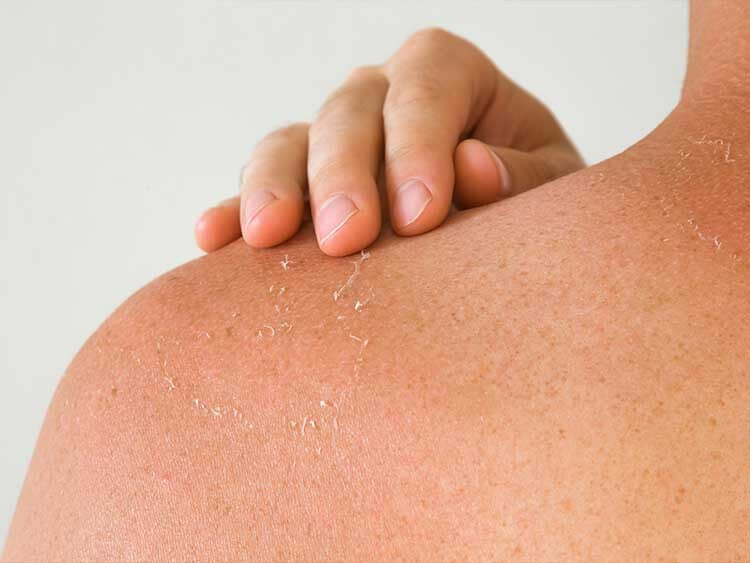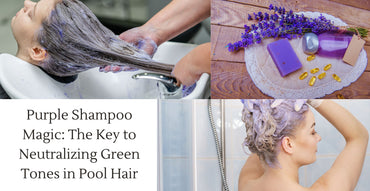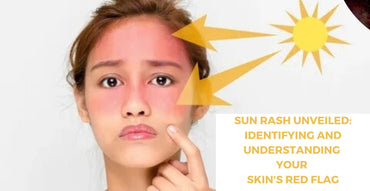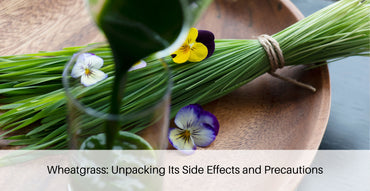For a lot of people, perfect skin is hard to achieve. Skin is prone to acne, dryness, and sun damage - just to name a few common skin concerns in the summer. But celebrities love flaunting clear and glowing skin in the summer, and you can do that too! We present some of our best dermatologist-recommended tips on how to get clear skin at home - starting today!
To achieve clear skin at home during the summer, a mix of regular skincare, a healthy lifestyle, and preventative measures is required. Stay hydrated, cleanse your skin, exfoliate regularly, use sunscreen, limit sun exposure, moisturise, choose oil-free products, cleanse after sweating, eat a healthy diet, manage stress, do not pick or squeeze pimples, sleep well, clean your phone and pillowcases, and consult a dermatologist are some summer skin care tips. Maintain clear and healthy skin throughout the summer and beyond by sticking to your skincare routine and making these habits a part of your daily life.
Is it possible to get clear skin in 3 days?
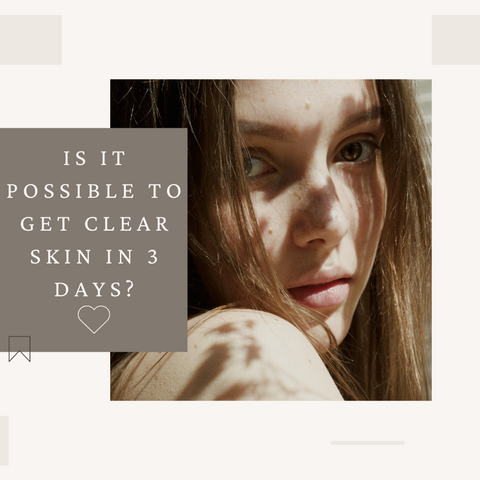
While uneven skin tone takes time to improve, there are certain cosmeceuticals that can enhance the look and feel of your skin overnight as well! In other words, the results are both instant and long-term - and it’s crucial to focus on both. We’re not talking about makeup or cosmetics. At best, makeup will help just to hide your blemishes or scars. But following a simple skincare routine can go a long way towards giving you nourished skin that’s spot-free and blemish-free every single day!
Here's why it is difficult to achieve clear skin in such a short period of time:
-
Skin Cell Turnover: On average, the natural process of skin cell turnover takes about 28 days. New skin cells are constantly being produced, while old ones are shed. This means that skin changes may not be visible in just three days.
-
Skin Conditions: Acne, rosacea, and eczema may require consistent treatment and time to improve. They are unlikely to disappear completely in a matter of days.
-
Inflammatory Responses: Pimples and blemishes frequently involve inflammatory responses, and even with effective treatment, the redness and swelling can last for several days.
-
Sun Damage: Sun damage to the skin builds up over time. While sunscreen and other sun-protective measures can help prevent further damage, existing sun damage may take several days to reverse.
-
Lifestyle Factors: Lifestyle factors such as diet, hydration, sleep, and stress all have an impact on clear and healthy skin. Positive changes in these areas may take longer to reflect on the condition of your skin.
Consult a dermatologist for significant and long-term improvements in the health of your skin. A dermatologist can provide personalised advice and treatments tailored to your specific skin concerns. Clear, healthy skin is usually the result of a consistent skincare routine, healthy lifestyle habits, and, in some cases, professional advice and treatment.
Skincare tips to get clear, glowing skin at home
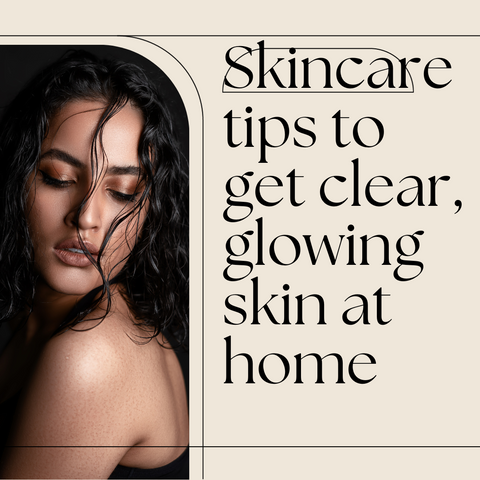
Tired of trying skin remedies that promise to give you clear skin overnight? While a proper skincare routine starts with daily efforts, getting a clear and glowing skin tone is a longer process. However, if you follow a healthy skincare routine for summer, results and improvements can be spotted in just a few days’ time as well. Here are some skincare tips to help you achieve clear and glowing skin:
-
Cleansing: To eliminate grime, makeup, and pollutants, cleanse your face twice a day (morning and evening) using a gentle, sulfate-free cleanser. Avoid using abrasive or strong cleaners, which can strip your skin of its natural oils.
-
Exfoliation: Exfoliate your skin 1-3 times a week to remove dead skin cells and reveal radiant skin. Depending on your skin type, use a gentle exfoliator such as a scrub or a chemical exfoliant (alpha hydroxy acids or beta hydroxy acids).
-
Moisturizing: Use a non-comedogenic moisturising product to maintain the hydration and suppleness of your skin. Skin that is well-hydrated usually glows naturally.
-
Sun Protection: Apply a sunscreen that is broad-spectrum and has a minimum SPF of 30 to shield your skin from damaging UV radiation. Sunscreen keeps skin healthy and helps avoid premature aging.
-
Diet and Nutrition: Eat a diet high in fruits, vegetables, whole grains, and lean meats. Antioxidant-rich foods like leafy greens and berries can help improve the condition of the skin.
-
Stay Hydrated: Drink plenty of water to stay hydrated and maintain your skin's natural glow.
-
Adequate Sleep: Aim for 7-9 hours of quality sleep per night. A good night's sleep is critical for skin regeneration and overall health.
-
Stress Management: Stress-reduction techniques such as meditation, yoga, or deep breathing exercises should be used. High-stress levels can cause skin problems.
-
Clean Your Phone and Pillowcases: Bacteria and dirt from your phone or pillowcases can get onto your skin. These should be cleaned on a regular basis.
-
Avoid Touching Your Face: To avoid the transfer of dirt and bacteria, avoid touching your face with your hands.
-
DIY Face Masks: To brighten and revitalise your skin, make homemade face masks with ingredients like honey, yoghurt, or oatmeal.
-
Eye Cream: Apply an eye cream to address specific issues such as puffiness or dark circles.
-
Consistency: Maintain a consistent skincare routine and be patient; results may take some time to appear.
-
Consult a Professional: If you have specific skin concerns, you should seek professional advice and treatment from a dermatologist.
Ask a dermatologist how to get clear skin
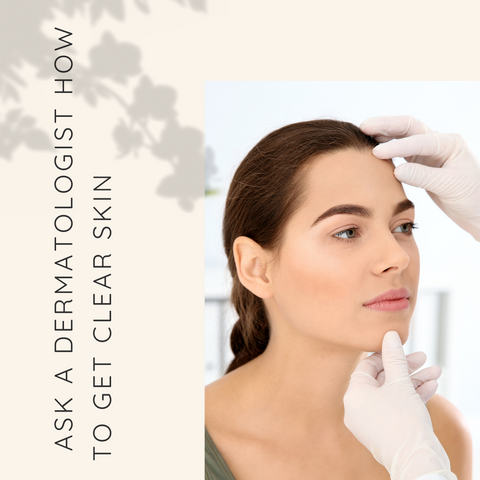
Consult a dermatologist for tailored advice and treatment options, especially if you have specific skin concerns or disorders. A dermatologist can evaluate your skin and provide tailored advise and treatment options. Cleaning, exfoliation, moisturising, sun protection, food and nutrition, hydration, sleep, stress management, cleanliness, avoiding touching your face, consistency, and consulting a dermatologist are some general tips to follow if you desire clear skin. Dermatologists are medical specialists who specialise in skin health and can provide you with the most appropriate and effective treatments and advise based on your specific needs.
Skin Assessment

A dermatologist or skincare specialist will normally do a proper skin examination to determine the condition of your skin. You can, however, perform a basic self-assessment at home to get a good sense of your skin's type and demands. Skin type, skin issues, acne and blemishes, pigmentation, wrinkles and fine lines, texture and pores, sun damage, skin sensitivity, hydration, and overall skin health are all covered in this simple self-assessment guide. If you have specific skin concerns or want to address specific issues, consult a dermatologist or skincare professional for a more thorough evaluation and personalised treatment recommendations. They can offer skilled advice and direction to help you achieve your skincare objectives.
How to get clear skin naturally
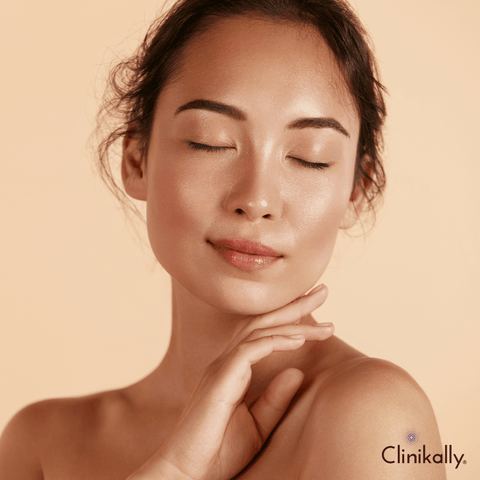
Wondering how to get clear and glowing skin without exposing your skin to harmful or damaging chemicals?
Adopting a skincare routine that focuses on gentle, nourishing, and non-irritating practises is essential for achieving clear skin organically. Some of the best skincare tips are designed to help you get clear skin naturally at home. For this, all you need to do is follow a simple skincare regimen in your everyday routine.
-
Get sufficient sleep: Your body needs sleep, and so does your skin! Every day and night, your dead skin cells are taken care of by new skin cell regeneration. To keep this process going healthily, sleep is vital. In fact, getting a good sleep of about 7 hours every night will do wonders for your skin!
-
Avoid hot water: Using hot water to shower or wash your face can damage or dry out your skin. So, if you are looking up ways to get clear skin naturally at home, it’s best to avoid hot water showers or baths.
-
Eat a healthy, balanced diet: Your skin needs nutrition - and the food you eat is going to provide that. Moreover, there are certain foods that cause acne or other skin concerns - and it’s best to avoid their consumption and opt for a healthy diet instead. Cutting down on excess sugar and fried foods is a good starter pack to get clear skin naturally at home.
-
Reduce stress: Negativity in the form of stress or anger will show on your skin. It’s because stress is accompanied by hormonal changes, which can cause acne or dullness of the skin. Meditation and a healthy lifestyle are some of the effective ways to combat stress.
Natural skincare practises centered on gentle, non-irritating products and a healthy lifestyle can help enhance the appearance and health of your skin over time. Keep in mind that clear skin is a gradual procedure with variable results. Be patient and persistent in your quest for naturally clear skin.
How to use cosmeceuticals for clear and glowing skin
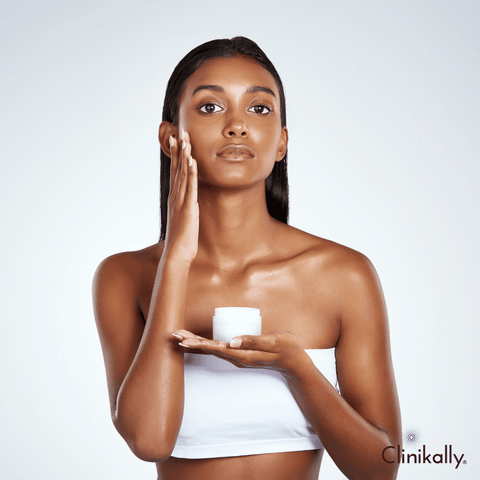
Dermatologists recommended that a daily skincare routine for clear, glowing skin should involve only non-comedogenic cosmeceuticals. This means that your skin products such as creams, serums, and lotions should not block pores in the skin, as this can lead to skin damage in the long term. For best results, a morning skincare routine is just as important as an evening skin routine. Complete care for the skin should involve the following steps:
-
Use a face wash twice a day: A foaming face wash has better cleansing properties for your face as compared to a gel-based face wash. But make sure your foaming face wash doesn’t cause skin irritation or skin damage.
-
Use a mild cleanser: For dry skin skin, hydrating face cleansers are the most effective. On the other hand, if you have oily skin, then face cleansers with Hydroxyl acids are going to bring you great results.
-
Exfoliate your skin: Use an effective and non-comedogenic exfoliant to clear dead skin cells from the surface of your skin. Without an exfoliant, your dead skin cells are going to collect on your skin barrier and even lead to frequent pimples or acne.
-
Don’t forget sunscreen: The summer sun can damage your skin in multiple ways, and even cause redness or rashes. Therefore, a good sunscreen with SPF 30 or SPF 50 needs to have a crucial place in your summer skincare kit!
Cosmeceuticals can be useful for addressing certain skin issues, but they should be used with caution and in conjunction with a well-rounded skincare programme. It's critical to seek advice from a skincare specialist, especially if you have complex skin conditions or are thinking about using harsher cosmeceutical treatments like retinoids or alpha hydroxy acids (AHAs).
The importance of hydration for clear skin

The importance of hydration in achieving and maintaining clear, healthy skin cannot be overstated. Here are some of the reasons why staying hydrated is essential for clear skin:
-
Maintains Skin Barrier Function: Adequate hydration aids in the maintenance of the skin's natural barrier function. A robust skin barrier works as a guard against pollutants, pathogens, and irritants in the environment. When the skin's barrier is damaged owing to dehydration, it becomes more susceptible to problems such as redness, inflammation, and infection.
-
Balances Oil Production: Dehydrated skin frequently compensates by producing more oil in order to retain moisture. This can result in clogged pores and acne breakouts. Proper hydration regulates oil production, lowering the likelihood of acne and blemishes.
-
Prevents Dryness and Flakiness: Dehydrated skin is dry, tight, and prone to flaky patches. Proper hydration keeps your skin soft, supple, and free of dryness, which can cause irritation and inflammation.
-
Improves Skin Tone and Texture: Hydrated skin has a smoother, more even texture. It can help reduce the appearance of fine lines and wrinkles, resulting in a clearer and more youthful complexion.
-
Reduces Redness and Inflammation: Dehydrated skin is more prone to irritation and redness. Proper hydration soothes and reduces inflammation in the skin, making it less prone to conditions like rosacea and eczema.
-
Enhances Wound Healing: Hydration is important for the body's natural healing processes. When your skin is well-hydrated, it can mend itself more effectively, which is important for minimising the visibility of scars and blemishes.
-
Improved Circulation and Nutrient Delivery: Hydrated skin has better blood circulation, which ensures that essential nutrients reach skin cells. This promotes a more youthful appearance and may aid in wound healing.
-
Skin with a Natural Radiance and Glow: Skin that has been properly hydrated has a natural radiance and glow. It appears fresh and vibrant, contributing to a clearer and more appealing overall appearance.
To maintain clear and healthy skin, it is critical to not only hydrate your skin from the outside with moisturisers, but also to hydrate your body from the inside by drinking plenty of water. Aim for 8 glasses of water per day, or more if you are physically active or live in a hot, dry climate. Also, to keep your skin hydrated and balanced, use a suitable, non-comedogenic moisturiser. In addition, for added moisture retention, consider incorporating hydrating ingredients like hyaluronic acid into your skincare routine.
DIY face masks for radiant skin
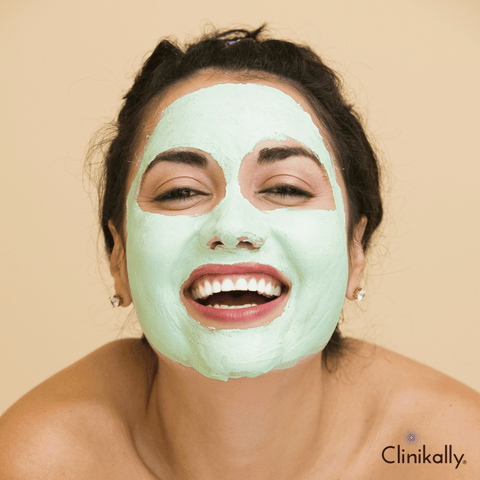
DIY face masks can be a simple and effective way to achieve radiant, glowing skin. Here are some easy and popular DIY face mask recipes to try:
-
Honey and Oatmeal Mask: Ingredients: 2 tablespoons of honey and 1 tablespoon of oatmeal. To make a paste, combine honey and oatmeal. Apply it to your face and leave it on for 15-20 minutes before rinsing with warm water. This mask is calming and exfoliates dead skin cells.
-
Yogurt and Turmeric Mask: Ingredients: 1 tablespoon of plain yogurt and 1/2 teaspoon of turmeric powder. Make a paste with the yoghurt and turmeric. Apply to your face and leave on for 10-15 minutes before rinsing with warm water. Turmeric has anti-inflammatory and antioxidant properties, and yoghurt can help with skin moisturization and brightness.
-
Avocado and Honey Mask: Ingredients: 1/2 ripe avocado and 1 tablespoon of honey. Mash the avocado and combine it with the honey. Apply the mixture to your face for 15-20 minutes, then rinse with warm water. Avocado is high in healthy fats and vitamins that are beneficial to the skin.
-
Banana and Lemon Mask: Ingredients: 1 teaspoon lemon juice and 1 ripe banana. After mashing the banana, stir in the lemon juice. After applying to your face, rinse it off with warm water after leaving it on for 15 to 20 minutes. Bananas add moisture, and lemon juice's vitamin C can help make skin look brighter.
-
Strawberry and Honey Mask: Ingredients: 3-4 ripe strawberries and 1 tablespoon of honey. Mash the strawberries and mix them with honey. Apply the mixture to your face, leave it on for 15-20 minutes, and rinse off with warm water. Strawberries contain natural salicylic acid, which can help exfoliate the skin.
-
Aloe Vera and Cucumber Mask: Ingredients: 2 tablespoons of aloe vera gel and 1/2 cucumber, peeled and blended. Combine the aloe vera gel and blended cucumber. Apply it to your face, leave it on for 15-20 minutes, and rinse off with cold water. This mask is hydrating and soothing, making it ideal for sensitive skin.
-
Papaya and Pineapple Enzyme Mask: Ingredients: two to three papaya and two to three pineapple chunks. To make a paste, mash the fruits or blend them together. Apply to your face and leave on for 10-15 minutes before rinsing with warm water. Both papaya and pineapple contain natural enzymes that can exfoliate and brighten the skin.
Before using any new ingredient on your face, always perform a patch test to ensure there are no adverse reactions. Additionally, if you have specific skin concerns or allergies, consult with a dermatologist or skincare professional before attempting DIY face masks.
Exfoliation: How often and why?
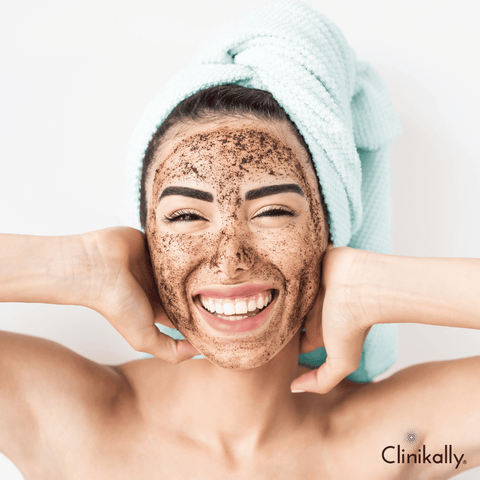
Exfoliation is an important step in skincare since it helps remove dead skin cells from the skin's surface, revealing a brighter, more youthful complexion. It can also help prevent clogged pores and breakouts by improving the efficacy of other skincare products. However, it is critical to exfoliate correctly and at the optimum frequency to avoid irritation and damage. Here's how often you should exfoliate and why:
Why Exfoliate:
-
Removes Dead Skin Cells: Dead skin cells can accumulate on the skin's surface over time, making it look dull and rough. Exfoliation aids in the removal of dead skin cells, revealing smoother, younger-looking skin beneath.
-
Enhances Skin Texture: Exfoliation can improve the texture of your skin and minimise the appearance of wrinkles and fine lines, giving your complexion a more youthful appearance.
-
Prevents Clogged Pores: Frequent exfoliation helps shield the skin from impurities that can cause breakouts of acne and blackheads.
-
Improves Product Absorption: Skin that has been exfoliated is better able to absorb and utilise other skincare products, such as moisturisers and serums.
How Often to Exfoliate: How often you exfoliate depends on your skin type, the kind of exfoliant you use, and the particular issues you are trying to solve with your skin. Physical exfoliants (scrubs), chemical exfoliants, enzyme exfoliants, sensitive skin, combination skin, and seeing a professional are some general principles. It's critical to pay attention to your skin and modify your exfoliating programme as needed. Excessive exfoliation can cause redness, irritation, and even skin damage. To avoid over-irritation of your skin, always follow the instructions on the product label and introduce new exfoliants gradually.
Sun protection for maintaining clear skin
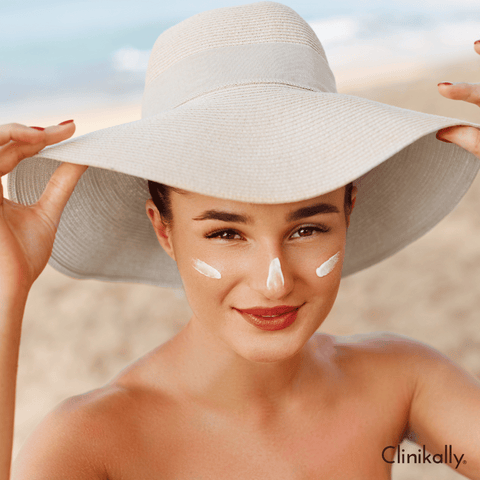
Sun protection is essential for preserving clear and healthy skin. UV radiation from the sun can cause a variety of skin problems, including premature aging, sunburn, skin cancer, and damage that can aggravate disorders like acne and rosacea. Here are some of the reasons why sun protection is vital for clear skin:
-
Prevents Premature Aging: The sun's UV rays can make skin age too quickly, resulting in wrinkles, age spots, and fine lines. Sunscreen helps protect your skin from these effects, keeping it looking youthful and clear.
-
Prevents Sunburn: Sunburn can cause skin peeling, redness, and pain. It can potentially cause long-term skin damage. Sunscreen functions as a barrier to protect your skin from sunburn.
-
Minimises Hyperpigmentation: Sun exposure can cause hyperpigmentation, such as sunspots and melasma, making the skin appear uneven and discoloured. Sunscreen can help prevent these problems.
-
Reduces Skin Cancer Risk: Prolonged sun exposure without protection raises the risk of developing skin cancers such as melanoma, squamous cell carcinoma, and basal cell carcinoma. Sunscreen can help to reduce this risk.
-
Prevents Acne Exacerbation: Some acne medications and treatments can make the skin more sun sensitive. Sun protection is essential to keep the skin from becoming more irritated and inflamed while using these products.
Here are some sun protection tips to keep your skin clear and protect it from the sun's harmful effects:
-
Use Sunscreen: Apply a broad-spectrum sunscreen with an SPF of at least 30 to all exposed skin, including your face, neck, and hands. Reapply every two hours if you are outside, or more frequently if you are swimming or sweating.
-
Choose Non-Comedogenic Sunscreen: Non-comedogenic sunscreens are less likely to clog pores and cause breakouts.
-
Wear Protective Clothing: Wear long-sleeved shirts and wide-brimmed hats to cover as much of your skin as possible. Lasses can also protect your eyes and the delicate skin surrounding them.
-
Seek Shade: To minimise sun exposure, seek shade during peak sun hours (usually between 10 a.m. and 4 p.m.).
-
Tanning Beds: Tanning beds emit harmful UV rays that can cause skin damage. To keep your skin clear and healthy, avoid them.
-
Protect Your Lips: Use an SPF lip balm to protect your lips from sun damage.
-
Be Aware of Reflection: Surfaces such as water, sand, and snow can reflect UV rays, increasing your exposure.
-
Regular Skin Exams: Examine your skin on a regular basis for any unusual moles, growths, or changes. If you notice any irregularities, see a dermatologist.
Keep in mind that wearing sunscreen should not only be done in the summer but also all year round. Even on cloudy days, UV radiation can still penetrate the skin, so it's essential to make sun protection a daily habit to maintain clear and healthy skin.
The role of diet in skin health

Diet has a huge impact on skin health. The foods you eat can have an immediate effect on the appearance and condition of your skin. Here's how your food affects your skin's health:
-
Hydration: Staying hydrated is critical to preserving skin health. Hydration keeps your skin moisturised and prevents dryness and flakiness.
-
Nutrient Intake: A healthy diet rich in key nutrients promotes skin health. Vitamins (A, C, E, and K), minerals (zinc, selenium), and antioxidants help keep skin supple, boost collagen formation, and protect against oxidative stress and damage.
-
Omega-3 Fatty Acids: Rich in fatty fish, flaxseeds, and walnuts, omega-3 fatty acids help preserve the lipid barrier that keeps skin supple.
-
Proteins: Consuming protein is essential for the synthesis of collagen and tissue repair. It supports the firmness and elasticity of the skin.
-
Antioxidants: Berries, leafy greens, and citrus fruits are high in antioxidants, which can help to neutralise free radicals, which can cause skin damage and premature aging.
-
Fruits and Vegetables: A fruit and vegetable-rich diet delivers vitamins, minerals, and fibre that promote overall health and skin shine.
-
Healthy Fats: Skin hydration and suppleness are enhanced by the consumption of healthy fats, which can be found in foods like avocados and olive oil.
-
Limit Sugars and Processed Foods: High sugar intake can cause glycation, a process that damages collagen and accelerates skin ageing. Acne may also be aggravated by high-glycemic-index processed foods.
-
Probiotics: A healthy gut microbiome—maintained by probiotics and prebiotic foods—can improve skin health by fostering a balanced immune response and lowering inflammation.
-
Foods High in Water: Foods high in water, like cucumbers and watermelon, can help you stay hydrated and support good skin.
-
Moderate Alcohol and Caffeine: Consuming too much alcohol or caffeine can cause the skin to become dehydrated. Moderation is key.
-
Sun Protection from Within: Certain foods, such as carrots and tomatoes, have compounds that help shield the skin from UV rays and offer some degree of internal sun protection.
-
Food Sensitivities: Identifying and avoiding foods that trigger skin sensitivities or allergies, such as dairy or gluten, can help maintain clear skin.
It's vital to remember that everyone's dietary demands and sensitivities are different. What works for one individual might not work for another. Consider seeing a dermatologist, nutritionist, or registered dietitian if you have specific skin concerns or dietary questions. They may provide personalised recommendations based on your needs and goals.
Managing acne for clearer skin

Acne is a prevalent skin disorder that affects people of all ages. It is treatable with a mix of proper skincare, lifestyle changes, and, in rare circumstances, medical therapies. Gentle washing, non-comedogenic products, regular exfoliation, moisturise, sun protection, avoiding picking and squeezing, food and nutrition, and staying hydrated are some ways to control acne for cleaner skin. Stress management, regular sleep, acne-friendly products, prescription drugs, expert treatments, lifestyle changes, and consultation with a dermatologist are all recommended. It's crucial to keep in mind that acne control takes time, and what works for one person may not work for another. To get clearer skin, be patient and consistent with your skincare routine, and consult a dermatologist for advice and specific treatments.
Benefits of a daily skincare routine
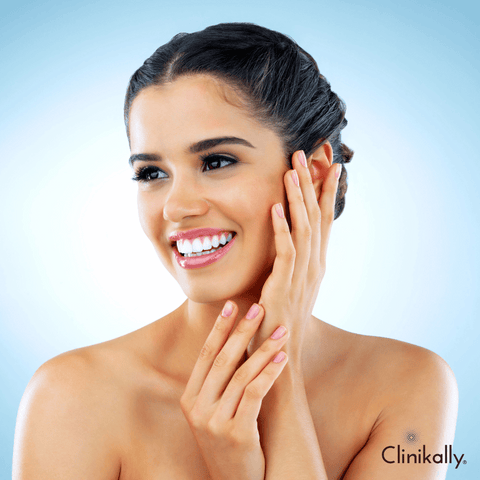
A daily skincare programme has various advantages for the health and appearance of your skin. Healthy skin, hydration, sun protection, acne prevention, collagen production, even skin tone, glowing complexion, pore minimization, prevention of premature ageing, consistency, customization, stress reduction, skin confidence, prevention of skin conditions, and expert guidance are some of the benefits of following a consistent skincare regimen. It's critical to remember that your skincare regimen should be personalised to your skin type and specific needs. What works for one person may not work for another, so seek personalised advice from a dermatologist or skincare professional. Furthermore, be patient and give your skincare routine time to produce visible benefits, as improvements may take weeks or even months to become obvious.

